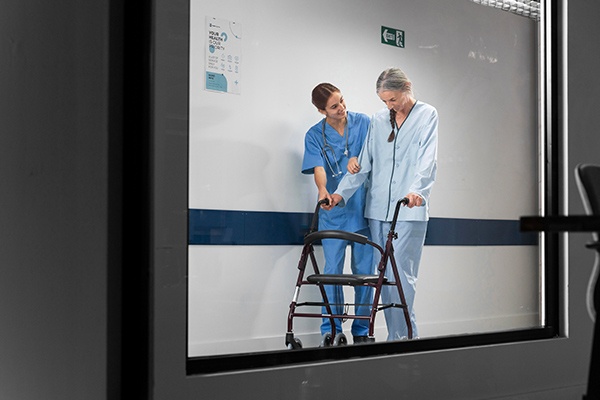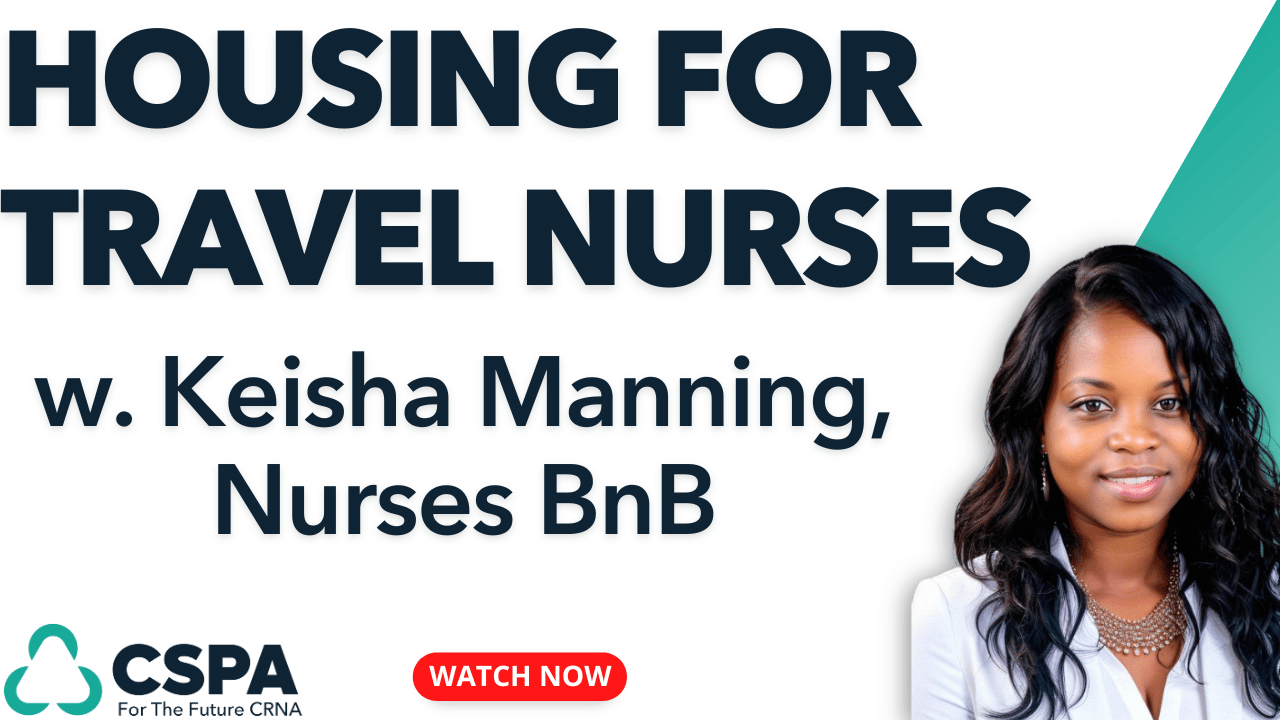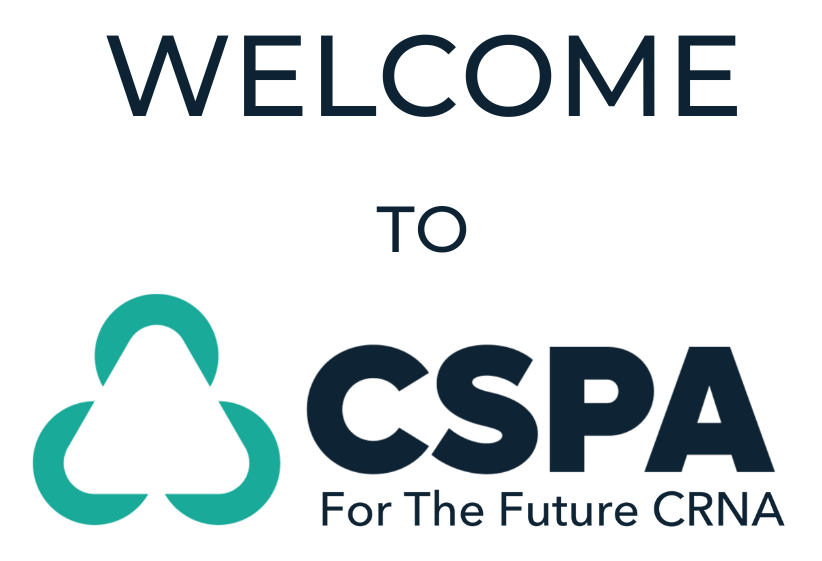
Get Your Free CRNA School Interview Prep Guide
Free CRNA School Interview Prep Guide Click Here
Starting to sweat every time you think of your CRNA school interview? Preparing well in advance is your best move, and we’ve got you covered! Every school has a different interview style, for certain. However, there are a few common types of questions you can expect during your CRNA school interview.
In today’s episode, we’re diving into all you need to know in advance, including:
- The vital importance of networking, attending open houses, and studying before you are even invited to interview
- Determining your level of emotional intelligence, and being able to play up your strengths for personal questions (Learn more about yours here! www.16personalities.com)
- The best strategies for answering seemingly random rapid-fire questions
- How to thoroughly prepare for pharmacological and clinical-based questions (and freshening up on that head math!)
- Understanding CCRN or essay-style questions, and how to stay on your toes
Happy interviewing, and you’ve GOT THIS, future CRNA!
Get access to planning tools, valuable CRNA Faculty guidance & mapped out courses that have been proven to accelerate your CRNA success! Become a member of CRNA School Prep Academy here:
https://www.crnaschoolprepacademy.com/join
Book a mock interview, resume edit or personal statement critique:
Join the CSPA email list: https://www.cspaedu.com/podcast-email
Send Jenny an email or make a podcast request!
Hello@CRNASchoolPrepAcademy.com
Join us at the CRNA School Prep Academy Conference!
https://events.crnaschoolprepacademy.com/
Grab a list of the most affordable CRNA Programs: https://www.cspaedu.com/affordable
—
Watch the episode here
Listen to the podcast here
CRNA Interview Styles, What To Expect?
Welcome everyone to another episode. We are going to be talking about interview styles and what are some variations that are out there so that way you can better prepare yourself as to what to expect. I want to start by saying that all schools will have a slightly different style that they partake in. Some of them can be similar, but that being said, without knowing, say, an upperclassman to ask, some students have no idea what they are walking into prior to getting to the interview. I encourage you to try to network, connect with upperclassmen and current CRNAs and discover what the interview style is like. A lot of schools will even tell you when you go to the open houses, what their interview style is like, and maybe even tell you some questions.
I do not really think the vast majority of CRNA school interviews are meant to be that secretive. Do not get me wrong. It is not like they want you to know all the questions you are going to be asked so that you can study up ahead of time. It is very unlikely that you will ever know that because even if you did get a few questions that they were going to ask you, it does not mean you are necessarily going to get asked those questions on your test day or on your interview day. A lot of times, they pull from such a big bank of questions that even if the candidate who interviewed right before you, gave you a tip on some of the questions, will you be asked that question? You may or may not be.
Personal Questions
I would not focus so much on the actual questions as I would on the style and trying to then prepare yourself for those types of styles of questions. That being said, let’s get into it. One of the first types of questions that schools will ask you and most schools will ask this to some extent, even if they tend to hit a heavy clinical style interview, are some personal questions. Some programs rely heavily on personal questions and almost exclusively on personal questions. Some schools will want to get to know you and some schools will spend ten minutes asking you personal questions, while other programs may interview you personally for over a half-hour. It can vary quite a bit based on the school, but personality-wise, a lot of these schools are evaluating something called emotional intelligence.
If you have not heard of that, I encourage you to start doing some research on emotional intelligence. They call them EQ, Emotional Intelligence. There are free EQ quizzes out there on the internet. I encourage you to look that up. I also recommend the website 16personalities.com. I had mentioned it here on this show before when I was talking with Richard Wilson, who is a faculty member. It is a great free assessment tool for you to use to evaluate your own personality style, what are some of your weaknesses, and what are some of your strengths. I encourage you to check it out.
Personality-wise, they want to get to know you. They want to know who you are, why you want to pursue anesthesia, what makes you so passionate about pursuing anesthesia. They want to understand that you know what you are getting yourself into. They want to see that you have a good understanding of what it means to be a CRNA. They may ask you the typical question, “Why CRNA? Why our program?” They could ask you, “What do you like to do in your free time? What color is your couch?” They can even throw out random questions like that. They could be doing various personality style assessments. A lot of times, they are looking to see how insightful you are into your own personality and key attributes as well as your weaknesses.
A lot of times, schools are looking to see how insightful you are into your own personality and key attributes as well as your weaknesses. Share on XIf you have been able to identify your weaknesses, what have you done to overcome those weaknesses or how are you working on those weaknesses? What is it about your routine and your daily routine that makes you better able to deal with problems; are you aware of potential weak points in your own character? That is what they are looking for on the personality side of things. They are also looking at how quickly you can speak on your toes. That is why the random questions exist out there. Another style I can point out is the fact that they could ask you random questions like, “If you could be any kind of pizza topping, what would you want to be and why? If you could be any kitchen appliance, what would you be and why?”
These questions are not meant to belittle you or make you feel interrogated. They are to see how you react under something that is completely off the wall. Also, can of come up on your toes quickly on the spot with a good rationale as to why you want to be a toaster or maybe you could say refrigerator because the OR is cold and you like being cold? It is not so much 100% about what you say, but it is more about the rationale you give behind it that is supporting it, being able to think on your toes off the cuff.
Clinical-Based Type Questions
The second type of interview style question is clinical-based type questions. This can be anything from pathophysiology to pharmacology, so a wide range of clinical style questions. The next variation from this clinical style is scenario clinical-based questions. I will lead into that next, but let’s focus on the path of physiology and pharmacology, and how it then can lead into scenario type questions.
Pathophysiology could be, “Tell me about sepsis or tell me about ARDS.” They may ask you, “What types of patients do you work with in the ICU?” If you mentioned liver failure patients, you better understand portal hypertension and the pathway of liver failure and why it causes portal hypertension. They are going to test you based on the information you give them. They are going to have you lead the way.
It is really important when you are being asked these clinical questions that you lead into what you are comfortable with. You can make or break your interview based on how you lead. Be careful what you say if you cannot fully explain it. If you do say it, make sure you can at least try to give some rationale as to support yourself. It is okay if you do not know, but tell them what you do know, even if it is very little. You at least want to give them something that shows them that you have some understanding of what you can speak to.
Do not be afraid. Do not be afraid to tell them what you do know. Even if it is wrong, do your best, try your best to give them what you think to be accurate. They are trying to gauge where you are at as far as how in-depth your knowledge is currently, but they could ask you those clinical-type pathophysiology questions, and they could also ask you pharmacological questions like, “Tell me about levophed and how does it work? What receptor sites does it work on? Tell me about famotidine.”

CRNA Interview Styles: Personality-wise, a lot of schools are evaluating something called emotional intelligence.
They could pick out anything random in there. Octreotide, if you mentioned the liver failure patient. “Do you use Octreotide frequently and why? How does that drug work?” The goal is to try to lead yourself down a pathway that you are comfortable with and have been working on understanding. As far as CRNA interviews, I tell everyone- you should not wait to study for your CRNA interview until after you submit your application for CRNA school. That should not be when you start studying. Unfortunately, that is when I think the vast majority of people start studying, but I am trying to give you a heads-up tip right now to please not do that. Please use your time in the ICU, the entire time, to study for the interview.
I know that seems ridiculous, but trust me, when you do it in small chunks like that, you are going to be building a more comprehensive understanding of what you are doing in the ICU, such that you are not going to be memorizing for an interview or a quiz. These panels do hundreds of interviews. They can easily decipher the knowledge that is understood versus the knowledge that has been memorized off Google the night before. They can really understand when you are spitting these things out of your mouth, whether it is coming from a place of understanding or whether it is coming from a place of memorizing.
That is why it is important for you to take it upon yourself from the day you step foot in the ICU to start studying. When you have a patient on certain drips, take some time to look up those drips. I used to print off things all the time in the ICU. Looking back on it, I am not sure how they felt about me always printing off papers, but if I had any kind of time where I am like, “This is an interesting drip. I have never used milrinone. What is milrinone?” I would look it up. I would print it out, “It is a phosphodiesterase inhibitor.” I would take those notes with me. I had a study binder that was super thick that I had studied over my two and a half years in the ICU prior to my interview.
Did I still get rejected on my first interview? Yes, I did. I can tell you going into my second interview that was extremely heavy pathophysiology and pharmacology, and it was a rapid fire that I did very well in that style interview because I had been studying my pathophysiology and pharmacology for a very long time in ICU. Maybe my personal interview skills were not up to par for my first one. That is definitely where I think I had my weak moment. It was in the personal type kind of questions. Going forward, if I had not gotten into the program I got into, I would have kept going.
I would have found a way to improve. I would have rehearsed what I said and how I could say it better. I would have gone back and I would have tried again. I would have kept doing so until I got a yes from some school somewhere. Persistence is key when it comes to CRNA interviews. Do not let one no deter you. You have to keep going and learn from it. Starting early is the best advice I can give you guys to prepare for your CRNA interview. It should be starting from the day you step foot in the ICU.
These questions are not meant to belittle you or make you feel interrogated. They are to see how you react under something that is completely off the wall. Share on X—
Hi future CRNA. I wanted to come on here to thank you guys for being loyal readers. I really appreciate you and everything joining me here every week. It means a lot to me and I enjoy so much helping you along your CRNA journey. I wanted to remind you, if you have not checked out CRNASchoolPrepAcademy.com, to go ahead and see what that is all about. We would love to mentor you inside the academy. For current students, high five. Big shout out to you. We appreciate you. We love all of you. It is so exciting to see you grow along this journey. If you are looking for more personalized guidance along your CRNA journey, it does not matter where you are. We have people who are still in nursing school.
I will say about the nursing school, though, I do think that the ideal time to join a nursing school was towards the end of it, so as a senior in nursing school and from there on, but you can be an ICU nurse of six years. You could have started your ICU journey. CRNA School Prep Academy will give you that one-on-one mentoring that guidance that you need to tackle your goals without hitting any roadblocks. I think the sooner you start investigating this career path and really taking it on and jump all in, the better you are going to be and the more prepared you are going to be.
We do educational workshops and live Q&A sessions every single month. Those are things that are going to help propel you guys towards your goal and allow you guys to miss the barriers and the obstacles that may stand in your way while getting the guidance you are seeking. Check out CRNASchoolPrepAcademy.com for more information. We hope to see you there. Let’s get into the show.
—

CRNA Interview Styles: Even if your answer is wrong, do your best. Try your best to give them what you think to be accurate.
Scenario-Style Questions
The next type of interview style question that I mentioned was scenarios. They can play into pathophysiology and pharmacology with scenarios. They can even lead you down an ACLS protocol. They can say, “This is your patient. This is the current vital signs. What do you think is going on?” You answer that and then say, “Now this happened. Now what is happening? They do not have a pulse. What are you going to do?” They could run you through an entire code situation to see, “Do you know your ACLS drugs? Do you know how to dose them? Do you know how to appropriately treat certain arrhythmias versus cardioversion versus defibrillation?”
They could be asking you all these types of questions and a clinical scenario style. They could also ask you scenario-style questions that are personality-based, meaning they could ask you, “Tell me about a time you dealt with a difficult coworker, and what did you do? Tell me about a time that you made a mistake in clinical and what did you do?” Personal scenario questions and clinical scenario questions can come into play.
Essays
The fourth style of interview question is essay and CCRN-style test questions. For this type of style, some schools do this, some schools do not, but some schools will give an on-the-spot essay. They will give you an essay prompt and you have to write a one-paragraph response to that prompt. Sometimes it is not a prompt that you have ever seen before. Other times, I know some schools will send out an article, say, a week or two before the interview and tell you to read it. Maybe they will not tell you why. Maybe they will tell you why.
If they do not tell you why and you do not read it, you might be in trouble because now the prompts are based off that article they sent you a week or two ago. They may tell you, “Read this article. You will have to write an essay on it during the interview.” I do not know whether they are going to tell you or not. Some schools have and some schools have not. If they do send you anything like that, read it and make sure you know it by heart. Make sure you understand it and have some concrete ideas. If they were to ask you some kind of on-the-spot essay, you could come up with something.
They could also completely give you a random prompt that has nothing to do with medicine at all. It could be completely off the wall, meaning they want to see how well you can organize your thoughts on a topic you are not familiar with at all. It goes back to the personality style questions, how quickly you can think on your toes and how you can organize your thoughts when you are put on the spot. That is the kind of rationale behind using those types of interview questions.
They could ask you these random questions, not to belittle you but to see if you can think on your toes. Share on XEQ Test
The next one is a CCRN-style test or an emotional intelligence test. I should mention that too. Some schools are using a test called CASPer and unfortunately, you cannot practice it before. It is out there. It is an actual EQ test that you can take or an exam that evaluates your emotional intelligence. The CCRN-style test is what they call a BKAT, A Basic Knowledge Assessment Test. You can look this up again. I do believe you can actually buy this test online. It does take up 2 or 3 weeks to be shipped to your house, so you have to plan ahead for this if you want to see this type of test ahead of time.
There is no online format. It is all written format. You have to mail away for it.. I think it is only $20. I think it would be well worth it if you could plan far enough ahead to go ahead and get that test. You might as well. It would not hurt anything. That is a basic knowledge assessment test. From what I have heard from students who have taken it, it is a smaller version of the CCRN. It is much easier than the CCRN is, so they say. It is a played-down version of it. I made a CCRN-style test inside CRNA School Prep Academy on the resource page. It is a variation of the CCRN-style test.
You could take a CCRN-style book and practice questions, and you should be in good shape. I am telling you to practice. Also, keep in mind, some schools make up their entire own variation of their CCRN style tests. I know my school did. They had basic math calculations. I was even asked head math during my interview like, “If you had a 0.4 milligram per kilo medication and you had a 60-kilo patient, how many milligrams would you give?” Basic head math on the spot in the interview, knowing some basic math, knowing ratios, percentages, conversions, all that is very important when you go into your CRNA interview.
None of it is very hard at all. However, if you are not familiar with it and you are not using it all the time, especially when you are put on the spot, you may come up blank. I encourage you to look into those things. As a CRNA School Prep Academy student, I have a math course for you. I have plenty of practice questions and an entire course on how to do ratios, conversions, percentages, and all of those things. Please take advantage of that math course. It is under the bonus section inside the academy, but if you have any heads up, you are going to have a style test, study math on top of CCRN style type information.
Diagrams
Other types of questions that could be on a CCRN-style type test are diagrams of, say, the heart. They could give you a diagram of the heart and say, “Trace a drop of blood through the heart.” You would have to label all the valves, ventricles, all of that. You would have to trace the blood through the heart. Also, knowing the branches that come off the aorta, they sometimes will ask stuff like that to see if people understand the branches that come off the aorta. They also can ask about the airway. They could show you someone’s airway anatomy and ask you to label that. There are all kinds of possibilities. I am not trying to overwhelm you.

CRNA Interview Styles: You should not wait to study for your CRNA interview until after you submit your application for CRNA school.
To play it safe, stick with some of the things that you routinely do on your unit. If you are a cardiac nurse, make sure you thoroughly understand the cardiac system. Everyone, no matter what unit you work in, in my opinion, should understand the cardiac system because we all have hearts. These programs always tend to hit that heavily regardless of what your background is.
Most of the time, they try to tailor the interview style to your background. That being said, I have heard programs that ask a neuro nurse cardiac questions or they ask a cardiac nurse neuro questions. I think they do that on purpose. I do not know how they could not do that on purpose, but it might be to test how much you know outside your specialty.
Random Questions
Anything is fair game. Starting early is key. Anything that is in that CCRN book is fair game, in my opinion, as far as that type of question. I think I have hit on all the types of questions. I mentioned random questions. They could ask you these random questions. It is not to belittle you. It is to see if you can think on your toes. My one friend was asked if she could be any kind of animal, what kind of animal would she be and why? She said a butterfly because they are pretty and they can fly away. I do not know if that was the answer they were looking for. It makes me laugh every time I think of it.
At the end of the day, think about these things and practice them. There are tons of practice questions out there on the internet. We also have a ton inside CRNA School Prep Academy. It is not that you want to kill yourself to get everything correct. It is just being familiar with the types of test questions that you could be asked. Not so you sound rehearsed, but so you sound like you can have some clear, concise thoughts. Keep in mind when you are thinking of scenario-type questions. At least, for me, I know it is hard to think back to an actual clinical scenario.
I can have ideas of things that happened to me in the past, but it is really hard for me to remember real particular moments. I can pinpoint a few in my anesthesia career, but that is only a few and I have been a CRNA for many years. These situations that I can think about are usually some pretty big events that happened to my patients. In my two and a half years as an ICU nurse, I did not have a whole lot. When I am asked on the spot, “Tell me about a time you had a disagreement with a coworker,” I have not had anything major come up. I am sure I have had little things, but do I hold onto that? No, I do not. I do not really tend to remember things like that.
I am encouraging you now to think about things like this so that way, you are making a note of that. If they are asking you these types of questions, you have a concrete story to tell them versus little chunks. That is how you dig yourself into a hole and use the STAR method, which is Situation, Task, Action, and Result. If you answer a scenario-type question using the STAR method, you will be able to keep the story organized, concrete, to the point, and the most important part, in my opinion, is giving that results or that outcome.
So many times, people will tell you a story, but they leave that part out and then it leaves you hanging like a cliffhanger. You are like, “Whatever came of it? What was your learning outcome from this situation?” You want to make sure you are giving them that versus leaving them hanging. Practice the STAR method when you are telling scenario-type questions. I hope that you found that helpful and good luck to you on your CRNA interviews. I am rooting for you. We will see you next time.
—
Future CRNAs, as always, I appreciate you and your loyalty. Thank you so much for tuning in. I would love to hear from you. Screenshot this episode and share it to your IG Stories with your biggest takeaway. Do not forget to include the hashtag #CRNASchoolPrepAcademy. Stay strong and I will see you next time.
Important Links
- Events.CRNASchoolPrepAcademy.com
- 16Personalities.com
- Richard Wilson – Back episode
- CRNASchoolPrepAcademy.com
Get access to planning tools, valuable CRNA Faculty guidance & mapped out courses that have been proven to accelerate your CRNA success! Become a member of CRNA School Prep Academy here:
https://www.crnaschoolprepacademy.com/join
Book a mock interview, resume edit or personal statement critique:
Join the CSPA email list: https://www.cspaedu.com/podcast-email
Send Jenny an email or make a podcast request!
Hello@CRNASchoolPrepAcademy.com
Join us at the CRNA School Prep Academy Conference!









